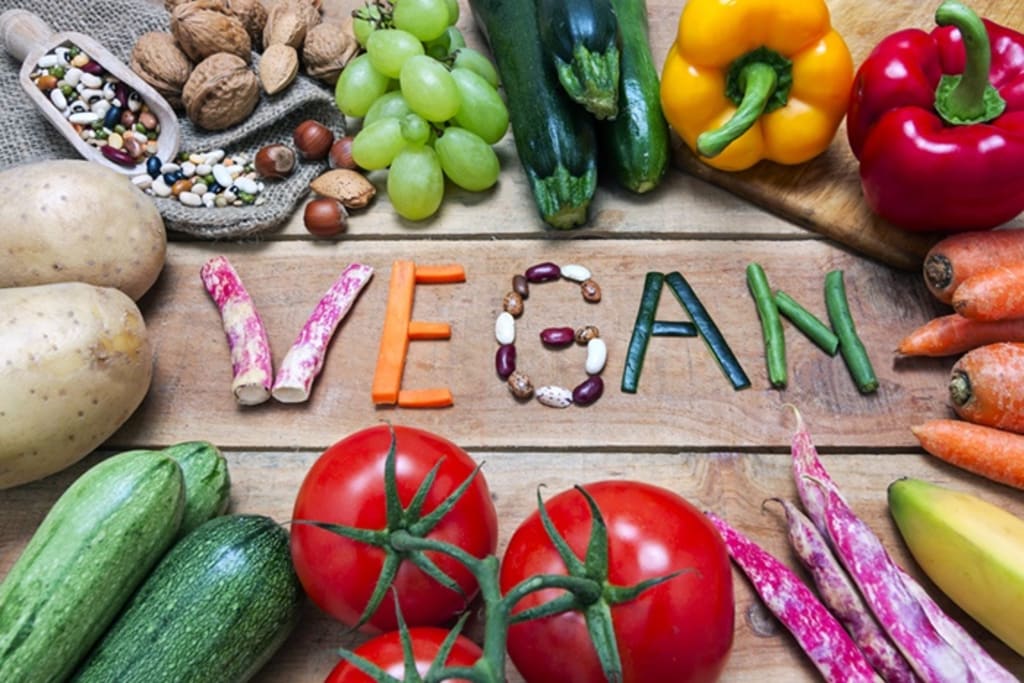The Ultimate Vegan Lifestyle: Health, Ethics, and Sustainability
Vegan Food

Introduction
Vegan Food is more than just a diet; it's a lifestyle choice that encompasses various aspects of health, ethics, and sustainability. At its core, veganism eliminates all animal products from one's diet and lifestyle, including meat, dairy, eggs, and even honey. Instead, it focuses on plant-based foods and products that do not exploit animals.
Health Benefits of a Vegan Diet
Improved Heart Health
One of the most significant health benefits of a vegan diet is improved heart health. Plant-based diets are naturally low in saturated fats and cholesterol, which are known to contribute to heart disease. By consuming more fruits, vegetables, whole grains, and legumes, vegans can maintain healthier cholesterol levels and reduce their risk of cardiovascular issues.
Weight Management
A vegan diet can be highly effective for weight management. Plant-based foods are generally lower in calories and higher in fiber, which helps you feel fuller longer. This can lead to reduced calorie intake and ultimately, weight loss. Many people find that transitioning to a vegan diet helps them achieve their weight goals without feeling deprived.
Lower Risk of Chronic Diseases
Studies have shown that a vegan diet can lower the risk of various chronic diseases, including type 2 diabetes, certain cancers, and hypertension. The high intake of antioxidants, vitamins, and minerals from plant-based foods helps in combating inflammation and oxidative stress, both of which are linked to chronic disease development.
Nutritional Considerations
Essential Nutrients for Vegans
While a vegan diet offers numerous health benefits, it’s crucial to pay attention to essential nutrients to ensure balanced nutrition. Key nutrients to focus on include:
Protein: Found in legumes, nuts, seeds, tofu, and tempeh.
Iron: Present in lentils, chickpeas, spinach, and fortified cereals.
Calcium: Obtainable from fortified plant milks, leafy greens, and almonds.
Vitamin B12: Available in fortified foods and supplements.
Omega-3 Fatty Acids: Sourced from flaxseeds, chia seeds, and walnuts.
Common Nutritional Deficiencies and Solutions
Vegans need to be mindful of potential deficiencies, such as vitamin B12, iron, and omega-3 fatty acids. Incorporating fortified foods and supplements can help bridge any nutritional gaps. Regular blood tests can also monitor nutrient levels and ensure you’re on track.
Supplement Recommendations
Supplements can play a critical role in maintaining optimal health on a vegan diet. Essential supplements to consider include:
Vitamin B12: Necessary for nerve function and red blood cell production.
Vitamin D: Important for bone health, especially in areas with limited sunlight.
Iron: Especially for women of childbearing age to prevent anemia.
Omega-3 DHA/EPA: Derived from algae, crucial for brain health.
Ethical Reasons for Going Vegan
Animal Rights and Welfare
One of the primary ethical motivations for adopting a vegan lifestyle is the welfare of animals. Veganism opposes the exploitation and suffering of animals in the food industry, advocating for their rights to live free from harm.
Ethical Farming Practices
Veganism also promotes ethical farming practices that do not involve animal exploitation. It encourages the support of sustainable agriculture methods that are kinder to the environment and more humane.
Personal Stories and Experiences
Many vegans share personal stories about their journey towards a compassionate lifestyle. These narratives often highlight the emotional and moral awakening that leads to the decision to go vegan, emphasizing the positive impact on their lives and the lives of animals.
Environmental Impact of Veganism
Reduced Carbon Footprint
A vegan diet significantly reduces one's carbon footprint. The production of plant-based foods generally requires fewer resources and produces less greenhouse gas emissions compared to animal agriculture.
Conservation of Water Resources
Animal agriculture is a major consumer of water. By shifting to a plant-based diet, you can drastically reduce your water usage, contributing to the conservation of this vital resource.
Decreased Deforestation and Land Use
The demand for livestock leads to extensive deforestation and land degradation. Adopting a vegan lifestyle helps in reducing the need for vast tracts of land for animal farming, thus preserving natural habitats and biodiversity.
Transitioning to a Vegan Lifestyle
Steps to Start a Vegan Diet
Transitioning to a vegan lifestyle can be smooth with a strategic approach:
Educate Yourself: Learn about vegan nutrition and the benefits of a plant-based diet.
Plan Your Meals: Start with simple vegan recipes and gradually expand your culinary repertoire.
Stock Your Pantry: Fill your kitchen with vegan staples like grains, beans, nuts, seeds, and fresh produce.
Find Alternatives: Explore plant-based alternatives to your favorite animal products.
Tips for Grocery Shopping and Meal Planning
Effective grocery shopping and meal planning are essential for a successful vegan transition:
Make a List: Plan your meals for the week and create a shopping list.
Buy in Bulk: Purchase grains, beans, and nuts in bulk to save money.
Explore Farmers’ Markets: Get fresh, local produce to support sustainable agriculture.
Read Labels: Ensure packaged foods are free from animal-derived ingredients.
Finding Vegan Alternatives
With the rise in veganism, finding alternatives to animal products has become easier than ever:
Dairy: Opt for almond, soy, oat, or coconut milk.
Meat: Try tofu, tempeh, seitan, or plant-based meat substitutes.
Eggs: Use flaxseeds or chia seeds as egg replacements in baking.
Veganism in Daily Life
Vegan Beauty and Personal Care Products
The vegan lifestyle extends beyond diet to include beauty and personal care products. Look for brands that are cruelty-free and free from animal-derived ingredients. Many companies now offer vegan makeup, skincare, and haircare products.
Vegan Clothing and Accessories
Ethical fashion is another aspect of veganism. Choose clothing made from sustainable, plant-based materials such as organic cotton, hemp, and bamboo. Avoid items made from leather, wool, and silk.
Navigating Social Situations as a Vegan
Social situations can sometimes be challenging for vegans. Here are a few tips to help:
Communicate: Inform your host about your dietary preferences in advance.
Bring a Dish: Contribute a vegan dish to share at gatherings.
Research Restaurants: Find vegan-friendly restaurants when dining out with friends.
Common Misconceptions about Veganism
Protein Deficiency Myths
One common myth is that vegans don’t get enough protein. In reality, a well-planned vegan diet can provide ample protein from sources like legumes, nuts, seeds, and whole grains.
Taste and Variety in Vegan Cuisine
Another misconception is that vegan food is bland and boring. On the contrary, vegan cuisine is diverse and flavorful, offering a wide range of delicious and creative dishes.
Expense of a Vegan Diet
Some believe that a vegan diet is expensive. While specialty products can be pricey, staples like beans, rice, and seasonal produce are often more affordable than meat and dairy products.
Vegan Recipes for Beginners
Easy Breakfast Ideas
Smoothie Bowls: Blend your favorite fruits with plant milk and top with granola and seeds.
Overnight Oats: Mix oats with plant milk and fruits, and let sit overnight for a quick breakfast.
Avocado Toast: Spread mashed avocado on whole grain toast and top with cherry tomatoes and hemp seeds.
Quick and Healthy Lunches
Quinoa Salad: Combine cooked quinoa with vegetables, beans, and a simple dressing.
Veggie Wraps: Fill a whole grain tortilla with hummus, greens, and assorted veggies.
Lentil Soup: A hearty, nutritious option packed with protein and fiber.
Delicious Dinner Recipes
Stir-Fried Tofu: Sauté tofu with vegetables and a flavorful sauce.
Spaghetti Bolognese: Use lentils or mushrooms as a meat substitute in this classic dish.
Chickpea Curry: A creamy, spicy dish served with rice or naan.
Veganism for Athletes
Enhancing Performance on a Vegan Diet
Athletes can thrive on a vegan diet with proper planning. Plant-based diets can enhance recovery and performance due to their anti-inflammatory properties.
Examples of Successful Vegan Athletes
Many athletes have successfully adopted a vegan diet, including tennis star Venus Williams, ultramarathon runner Scott Jurek, and bodybuilder Patrik Baboumian.
Sports Nutrition Tips for Vegans
Protein: Include a variety of protein sources in your diet.
Hydration: Stay hydrated with water and electrolyte-rich beverages.
Recovery: Incorporate nutrient-dense foods like berries, nuts, and leafy greens for optimal recovery.
Cultural Perspectives on Veganism
Veganism Around the World
Veganism is embraced globally, with different cultures offering unique plant-based dishes. Countries like India, Ethiopia, and Japan have rich traditions of vegetarian and vegan cuisine.
Traditional Vegan Dishes from Various Cultures
India: Chana Masala, a spicy chickpea curry.
Ethiopia: Injera with lentil stew and vegetable dishes.
Japan: Vegetable sushi and miso soup.
Adapting Cultural Recipes to be Vegan
Many traditional recipes can be easily adapted to vegan versions. For instance, replacing meat with tofu or tempeh in stir-fries or using plant-based milk in desserts.
Vegan Advocacy and Community
Joining Vegan Groups and Communities
Connecting with others who share your values can be incredibly supportive. Look for local vegan groups, online forums, and social media communities.
Volunteering and Activism
Get involved in vegan advocacy by volunteering with animal rights organizations, participating in protests, or educating others about the benefits of a vegan lifestyle.
Sharing Your Vegan Journey
Inspire others by sharing your vegan journey on social media, blogs, or through conversations with friends and family. Personal stories can be powerful tools for change.
Overcoming Challenges
Dealing with Criticism and Stereotypes
Criticism and stereotypes can be challenging. Stay informed and confident in your choices, and engage in respectful conversations to educate others.
Staying Motivated and Committed
Keep your motivation high by reminding yourself of the reasons you chose veganism. Connect with like-minded individuals and celebrate your progress.
Handling Cravings and Temptations
Cravings can be managed by finding satisfying vegan alternatives and ensuring you eat a balanced diet. Keeping healthy snacks on hand can also help.
Future of Veganism
Trends and Innovations in Vegan Products
The future of veganism looks promising with ongoing advancements in plant-based alternatives:
Plant-Based Meat: Companies are developing meat alternatives that closely mimic the taste and texture of traditional meat.
Dairy-Free Products: Innovations in dairy-free milk, cheese, and yogurt are expanding options for vegan consumers.
Egg Substitutes: Plant-based egg substitutes are gaining popularity in baking and cooking.
The Growing Popularity of Plant-Based Diets
More people are embracing plant-based diets for health, ethical, and environmental reasons. This shift is prompting restaurants, food manufacturers, and supermarkets to offer more vegan options.
Predictions for the Future
As awareness grows about the benefits of veganism, it’s expected that plant-based diets will become even more mainstream. Innovations in food technology and increasing consumer demand will continue to drive the market towards more sustainable and ethical food choices.
Conclusion
In conclusion, adopting a Vegan Products offers a multitude of benefits, including improved health outcomes, ethical considerations regarding animal welfare, and positive environmental impacts. Whether you’re motivated by health, ethics, or sustainability, transitioning to a vegan diet can be a rewarding journey towards a more compassionate way of living.
About the Creator
Enjoyed the story? Support the Creator.
Subscribe for free to receive all their stories in your feed. You could also pledge your support or give them a one-off tip, letting them know you appreciate their work.





Comments
There are no comments for this story
Be the first to respond and start the conversation.